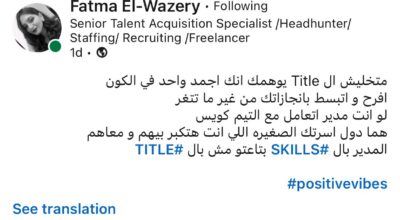It’s an interesting time to be a globalized Egyptian. A coffee kanaka in a world of Nespresso.
As a psychologist from the millennial generation in Egypt, I realized that one of the biggest paradoxes is a function of being in the middle of two very strong currents: individualism (I would call it ‘hyper-individualism’) and collectivism.
Collectivism is when society members give more importance to the group than the individual, and individualism is when the notion of being an individual is prioritized in society.
The millennial generation has received education and technological exposure that could be said to prepare its members for being “international” citizens of the world. Yet, we are firmly planted in our families and social circles with little to no experience with diversity. This does create a very specific worldview and way of being.
Let’s look at the bird’s eye view: In Egypt we lack law enforcement. What? You don’t agree? Sue me.
So in order to survive in a lawless world, we bind together. We share more things. It is not an unusual experience to crowdfund, or attend a stranger’s wedding; which serves a purpose and makes Egyptians affable and lovable. Without this collectivist “el lamma el helwa” spirit, we simply will not survive. This collectivism comes in the form of togetherness; being a family, being a group of friends etc. So there is a real sense of “let’s stick together”.
What happens when we stick together?
Of course we develop a lot of familiarity and sit through a great deal of small talk. For example, we endlessly chat about Ramadan desserts, our summer plans, or the cost of petrol; some of the lowest common denominators of conversation. But something is overlooked in that trance of togetherness.
Boundaries.
I know that the word ‘boundary’ often has a negative connotation. But it has a negative connotation for a good reason. There is no way someone will be strictly adhering to their boundaries (whatever they may be) without being criticized; ganged up on; ostracized; or be called ‘arrogant’. Emotions will come up with boundary setting, guaranteed.
This sounds skeptical and negative. But let me illustrate this using an example.
A friend of mine started a job at an academic center for children. She talked to me about how warm and friendly her bosses were. “They are so domestic and nice.” She would keep repeating to me. Every time she would talk about her job she would mention something her boss did to be nice to her. “She left me chocolates in my drawer today”; “I stayed over the holidays because she needed to be in Spain for a wedding.”
She would feel very special; almost like she was with a bigger sister. Instrumental. Useful. She belonged. Even though, in the background; the truth of it was that she was being underpaid; with no prospects for the future.
But my friend never spoke up. Because that is not what nice girls do. This would risk being shamed forever as someone who actually needs the money. God forbid!
So in a way, the workplace used her individual accomplishments in order to employ her in a “family”. A family so close that it is often very difficult to ask for what we really need from our jobs. So the illusion of being cared for and befriended becomes the obstacle in our way to assertiveness and clarity in the workplace. That warm fuzzy togetherness comes at a personal cost.
In individualist societies, the individual is able to represent themselves fully; to the extent that food preferences are becoming so nuanced and exhausting. Of course this causes negative, loaded experiences as well; but the individual is treated with a certain level of caution and “7esab”.
They don’t need to be friends with their boss, or the HR manager. Holiday decisions are not always decided on as a “family”, they are more surgical and with the least friction possible. That also allows them to leave to seek a better opportunity without feeling guilt, because they feel that they could get a better offer somewhere else. The player plays the game, the game plays the player. It’s all business.
In Egypt’s professional topography; although we are a deeply connected people, we are still on our own. Of course there is the occasional “hire your friend” situation, but at the end of the day, your CV stands alone. There is no other time when this aloneness has been more apparent than with the rise of influencer culture and social networking. Actually, what one person can achieve just on the basis of a good reputation is more than in individualized society. Much more.
But that keeps us in a tight spot. We become so careful and defensive of our reputations. This leaves room for those over-familiar bosses who pretend to be “just like your sister”; or the brotherly co-worker who uses you for rides yet never offers anything back.
You oblige. Why? Because your reputation is on the line. Our frames of reference for relationships always have a familial undertone of reprimand to them; without the family support.
I guess how I would describe Egypt’s professional topography as: Collecto-individualism. Boundaries are blurred, but you’re still on your own at the end of the day.
So what is a boundary?
That elusive line we draw around our spiritual, mental, physical and psychological components of who we are.
Maya Angelou once said “There is a place inside you that you must keep pristine, clean”. She was referring to personal boundaries. Boundaries are often teased, evaded, or skipped by others if you do not find a way to artfully craft them. To perfect that enchanted line is not something many people can do. This is because we love to be loved. We are simple beings. We need belonging, certainty, connection and holding. But like anyone who needs those things, we open ourselves up to exploitation at the worst, and a hint of emotional blackmail at best.
So how do we set functional boundaries?
One of the best ways we can effortlessly have boundaries is to make sure we do not over-identify with what we do. Work is work. It is not who we are. Finding an alternative identity is crucial, it protects us against work woes.
Secondly, using your emotions as a guiding light. Your emotions are your best friend. They will nudge and guide you and act as thermostats to your environment. Find ways to nurture your emotions and understand them; name them, open them up in safe spaces. Get to know what you like and what you don’t.
This is done through long iterative self-reflective journeys, journaling, meditation and alone time. Taking stock of our alone time will allow us to start building a functional boundary with others; because we know what it is we are protecting from the world. The feeling of being alone and satisfied gives us a shield against toxic togetherness.
I am not promising that people will like you more for it; but it could bring you some clarity and focus, congruence and wholeness. The goal is to finally find a sweet spot of connection with others that will carry you across life’s many hurdles. Of course the togetherness is beautiful, and life means nothing if it was not shared, but togetherness will fall apart and break into a million little fragments if boundaries are not acknowledged.




























